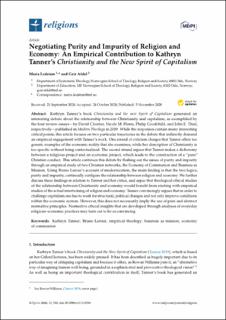| dc.description.abstract | Kathryn Tanner’s book Christianity and the new Spirit of Capitalism generated an interesting debate about the relationship between Christianity and capitalism, as exemplified by the four review essays—by David Cloutier, Nicole M. Flores, Philip Goodchild, and John E. Thiel, respectively—published in Modern Theology in 2019. While the responses contain many interesting critical points, this article focuses on two particular trajectories in the debate that indirectly demand an empirical engagement with Tanner’s work. One strand of criticism charges that Tanner offers too generic examples of the economic reality that she examines, while her description of Christianity is too specific without being contextualized. The second strand argues that Tanner makes a dichotomy between a religious project and an economic project, which leads to the construction of a “pure” Christian conduct. This article continues this debate by fleshing out the issues of purity and impurity through an empirical study of two Christian networks, the Economy of Communion and Business as Mission. Using Bruno Latour’s account of modernization, the main finding is that the two logics, purity and impurity, continually configure the relationship between religion and economy. We further discuss these findings in relation to Tanner and her critics, and argue that theological ethical studies of the relationship between Christianity and economy would benefit from starting with empirical studies of the actual intertwining of religion and economy. Tanner convincingly argues that in order to challenge capitalism one has to work for structural, political changes and not only improve conditions within the economic system. However, this does not necessarily imply the use of pure and abstract normative principles. Normative ethical insights that are developed through analyses of everyday religious–economic practices may turn out to be as convincing. | en_US |

